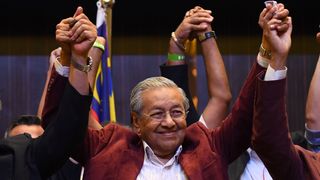The election victory of the Mahathir Mohamad-led Pakatan Harapan coalition — translated as Alliance of Hope — is compelling evidence of the political maturity of the Malaysian people.
The extraordinary result is an early but significant step towards genuine democratic political reform for Malaysia. It also represents a final chance for Mahathir to redeem his reputation and secure his standing as one of the most important postwar statesmen in Southeast Asia.
The past decade has been a poor one for democracy in the world. This year represents the 12th in a row that political reform has gone backwards.
In Southeast Asia, only Indonesia is considered “free” by Freedom House. All other Southeast Asia states, including Malaysia, are rated “partly free” or “not free” when it comes to assessment of the rights for opposition parties, universal suffrage, regular elections and secret ballots, absence of voter fraud and press freedom.
Even though standards of democratic practices rise and fall frequently depending on the government in power, most elections throughout Southeast Asia are free or fair but not both.
Malaysia is frequently upheld as an example of yet another Asian polity content to trade away democratic rights in return for stability and economic development. The United Malays National Organisation-dominated coalition has been in power since the country held its first general election in 1959.
Although previous Malaysian leaders became improbably wealthy given their modest salaries, the groundswell of discontent against prime minister Najib Razak was unprecedented, including from my Malaysian relatives and friends who were lifelong supporters of UMNO or who had never shown any interest in politics.
The economy has averaged about 5 per cent gross domestic product growth since recovering from the global financial crisis in 2010. If any Southeast Asian country has such a social contract, it would be Malaysia.
In the just-concluded elections, the usual measures were deployed by the UMNO government to remain in power. Electoral boundaries were redrawn to increase the number of constituencies likely to favour the incumbents.
By the time of polling day, parliamentary seats held by the ruling Barisan Nasional alliance had just less than half the number of voters compared with those expected to go to the opposition parties. The Electoral Commission, which has long enjoyed a cosy relationship with UMNO, removed pictures of Mahathir on billboards and state-owned media was dominated by government messages.
Even so, political and community organisers supporting the opposition responded by spreading their messages through blog sites, social media, and even emails and texts. Malaysians offered funding assistance to fellow citizens to help them return to their home town and ensure they could vote.
On polling day, many companies sympathetic to the opposition offered employees the day off to have their say, and others organised ride-share services to ensure voter turnout was high.
Although previous Malaysian leaders became improbably wealthy given their modest salaries, the groundswell of discontent against prime minister Najib Razak was unprecedented, including from my Malaysian relatives and friends who were lifelong supporters of UMNO or who had never shown any interest in politics.
For a country that once offered “Asian values” as a counterpoint to and rejection of Western liberal democracy, the belief by many Malaysians that the incumbent leader and government had compromised the country’s national interest and international standing is a sign of a maturing polity.
The cause of most angst was the strong suspicion that Najib had personally misappropriated more than $900 million from the 1Malaysia Development Bhd initiative, which he set up in 2009 to turn Kuala Lumpur into a regional financial hub.
The US Department of Justice believes that more than $4.5 billion has been stolen from the public fund.
There is the supreme irony that it falls on Mahathir to dismantle or at least lessen the apparatus used by incumbent governments to suppress the opposition and opposing views to the government given that it was he who established much of that apparatus.
French diplomat and historian Alexis de Tocqueville observed in the 19th century about the American Republic that democratic society was endangered not by the profligacy of a few but the laxity of morals among all. Notwithstanding any residual “Asian values”, the victory of Pakatan Harapan is evidence that Malaysian civic nationalism and polity are rapidly maturing.
There is a long way to travel for the genuine advance of parliamentary democracy in the country. There is the supreme irony that it falls on Mahathir to dismantle or at least lessen the apparatus used by incumbent governments to suppress the opposition and opposing views to the government given that it was he who established much of that apparatus.
If Mahathir hands the prime ministership over to Ibrahim Anwar, who will be released from jail next month, then the keeping of promises and the orderly transition of power to his former rival, who was rendered a pariah on false charges, bodes well.
Finally, and at the age of 92, it is a chance for Malaysia’s longest serving leader to make amends and secure a happier place in the history books.
Mahathir receives credit for the country’s economic achievements since independence more than six decades ago.
In the 22 years he served as prime minister, he is also criticised for entrenching his personal power at the expense of building stronger institutions needed to guard against political and economic corruption by the country’s ruling elites.
One rarely has a second chance in politics and it is time to make amends.






